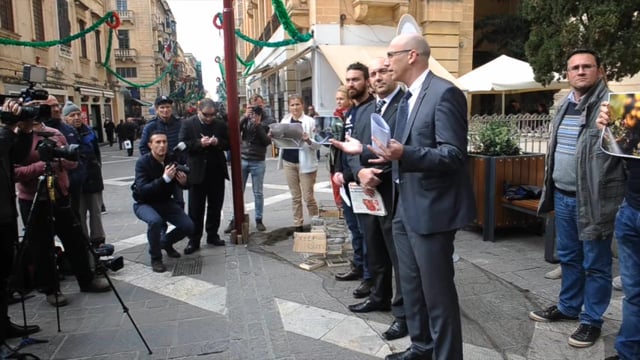[WATCH] Political promises are not a valid reason to derogate from trapping ban - BirdLife Malta
BirdLife Malta have slammed the 'political promises' that led to what was described as 'the current free for all' in songbird trapping


BirdLife Malta have slammed the “political promises” that led to what it described as "the current free for all” in songbird trapping.
This was said during a press conference held by the environment organisation outside the law courts this morning, ahead of Malta's hearing before the European Court of Justice tomorrow. The court will begin hearing the European Commission's case against Malta on finch trapping, a practice that was banned following Malta’s accession to the EU but reintroduced by the Labour government.
BirdLife Malta President Darryl Grima, made reference to MaltaToday on Sunday's revelation that the Attorney General had advised against opening the season, on the grounds that it was “legally indefensible.” The AG had warned the government that its legal arguments in sustaining the derogation were “very weak” and that “no amount of political rhetoric would persuade the European Court to not rule against Malta.”
The office of the AG is not a legal office but a constitutional institution whose job it is to give legal advice to government, Grima said. “It's like there was a door with a no entry sign and a person, the AG is next to it telling you not to open it, but Malta still did so...So much so that Parliamentary Secretary for Agriculture Fisheries and Animal Rights Roderick Galdes chose not to use the AG to represent Malta's case, opting instead for a private law firm.”
Mark Sultana, the organisation's Chief Executive criticised the police for “nearly never taking the initiative” and alleged that the strict surveillance, a condition of the derogation, was merely window dressing and was “practically impossible to enforce.”
The method of trapping used - clap nets - was also specifically outlawed. Aerial footage which the organisation published today, showed 49 illegal trapping sites from the 80 spotted. Sultana observed that the police were only reacting to BirdLife Malta's information and were not taking a proactive approach to combating illegal trapping.
Conservation manager Nicholas Barbara highlighted that trapping licenses had been opened to all, instead of reining in the trapping culture. After 2014, when the licensing policy changed, 4,600 persons applied. Every trapper is allowed two nets and can legally trap 10 bids each. “But in the three years since the derogation had been applied, the quota of 500 Hawfinches had only been reached twice and the rest of the species' quotas had never been reached.” The Wild Birds Regulation Unit had been informed of the problems in advance, but surveillance has been shown to have failed, Barbara said. Worse, the single use rings on trapped birds turned out to be reusable and this had left to there being “effectively no control on numbers.” Pet shops and markets are running a flourishing trade in these birds, he said.
Sultana asked what the Opposition's position on the issue was, pointing out that trapping was supposed to be phased out as part of Malta's EU accession. “Political promises are not a justifiable reason to derogate.” This was not an action against Malta's people, but against the government's wrong decision in 2014, he said.
When Malta joined the bloc in 2004, a ban on finch trapping was one of the conditions of the accession treaty, as trapping of all birds is prohibited by EU law. The practice was phased out and eventually banned in Malta in 2009, in line with its EU accession treaty, however, the Labour government in 2014 reintroduced the trapping of seven species of wild finches – on the assumption that it can justly derogate from EU law in a similar fashion to spring hunting.
When applying the derogation, the government had argued that an article in the EU Birds Directive allows EU member states “where there is no other satisfactory solution… to permit, under strictly supervised conditions and on a selective basis, the capture, keeping or other judicious use of certain birds in small numbers.”
MaltaToday reported on Sunday that the Maltese government had, however, ignored legal warnings by the Attorney General that the derogation ran counter to the spirit and purpose of the Birds Directive and that in the event of infringement proceedings Malta’s legal arguments were “inherently weak.” In September 2015, the European Commission officially referred Malta after the government ignored its formal warnings as part of an Infringement Procedure launched after the reinstatement of the trapping season. The Commission – spearheaded by former Labour minister Karmenu Vella – has argued that the traditional Maltese use of clap nets is “non-selective”, and that trapping birds for leisure does not constitute a “judicious” reason to derogate, and there are suitable alternatives.
Government rejects NGO claims
The Maltese government has denied the claims, which they said were "pure speculation" and a last-ditch attempt at influencing the proceedings of the European Court of Justice. "The Attorney General's advice to the government in this and other cases of infringement proceedings is confidential, and is protected by legal and professional privilege... The Attorney General's Office has never advised the government that the case is 'legally indefensible', let alone that it 'will be thrown out of the Court", as is being alleged."
The government said the claims have previously been fully rebutted in detailed published technical reports, press statements, as well as in submissions made to the European Commission and the European Court of Justice. "The government shall continue to defend Malta’s right to apply derogations, in full accordance with EU, international, and national law, and has provided all necessary legal, technical and scientific evidence to substantiate its case."
















.png)




